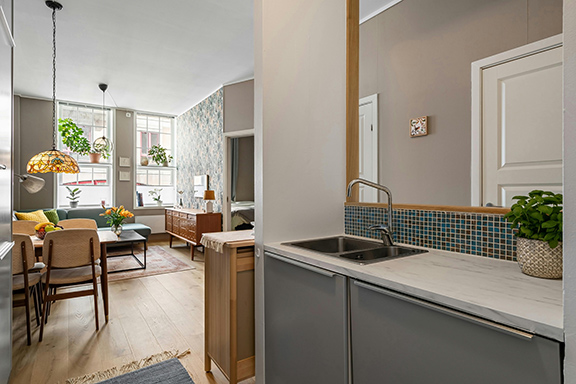Embarking on the journey of condo ownership in Chicago can be a real adventure, offering a mix of urban convenience and community living. The city’s diverse neighborhoods, walkability, and proximity to countless amenities make condos an attractive option for buyers. However, this lifestyle comes with its own set of considerations, from understanding Homeowners Association (HOA) fees and building regulations to navigating potential compromises on privacy and maintenance responsibilities.
In this blog post, we’ll delve into the intricacies of buying a condo in Chicago, providing actionable insights to help you make informed decisions. We’ll explore the dos and don’ts, demystify the condo-buying process, and offer valuable tips to ensure your investment is both sound and fulfilling.

Pros and cons of condo living in Chicago
Condo living is a great way to experience urban living without the full-blown commitment of a single-family home. Before diving into the details of the condo-buying process, it’s important to weigh the pros and cons of condo living in Chicago. Understanding the benefits and drawbacks will help you make an informed decision about whether condo life is right for you.
Let’s start with the pros:
Low maintenance
One of the main attractions of living in a condo is the low maintenance required. The HOA typically takes care of building upkeep, including common areas, landscaping, and sometimes even utilities like cable TV and internet. This means you won’t have to worry about mowing the lawn or fixing the roof—allowing you to spend more time enjoying your home.
Amenities
Many condos come with shared amenities such as gyms, pools, and party rooms. This can save you money on things like gym memberships and give you access to spaces you might not have in a traditional home.
Security
Condos often provide more security than single-family homes. With features like 24/7 doormen, buzzed entry, and security cameras, you’ll feel more secure in your unit, especially in a busy urban environment like Chicago.
Location
Condos are typically located in prime urban areas, allowing you to be close to the action. Whether it’s dining, shopping, entertainment, or public transportation, condo living is about convenience.
Cons:
HOA fees
While HOA fees cover maintenance and amenities, they can add a significant monthly cost to your budget. These fees can range from a few hundred dollars to over a thousand dollars a month, depending on the size of the building and the amenities offered.
Limited privacy
Condo living means sharing walls, floors, and ceilings with neighbors, which can limit your privacy. While some people enjoy the sense of community, others may find the noise and proximity to others a challenge.
Building rules and restrictions
Many condo buildings have strict rules regarding things like noise, pet ownership, and renovations. These rules can sometimes feel restrictive, so it’s important to review them carefully before deciding on a specific building.
Special assessments
Condo owners may be required to pay special assessments if the building needs repairs or upgrades. This can come as an unexpected expense, so it’s important to ask about the building’s financial health before buying.
 Important questions to ask about HOA fees and rules
Important questions to ask about HOA fees and rules
When you’re considering buying a condo, understanding the HOA fees and building rules is essential. These fees and regulations can have a significant impact on your experience as a condo owner. Here are some key questions to ask:
- What do the HOA fees cover?
It’s important to understand exactly what your HOA fees cover. Typically, they will cover maintenance of the building’s common areas, landscaping, and amenities. However, some condos may include utilities like water, heat, and air conditioning in the fees, while others may not. Clarifying this can help you budget more accurately.
- How much are the HOA fees?
Make sure you know the exact amount of the HOA fees and how often they are due (monthly, quarterly, etc.). High fees could eat into your budget, so be sure the total cost of owning the condo fits within your financial plans.
- Are there any upcoming fee increases or special assessments?
Ask if the HOA has any plans to increase the fees or impose special assessments in the near future. Special assessments are often required for large building repairs or improvements, and knowing about potential costs upfront can help you avoid surprises.
- What rules and restrictions are in place?
Each condo building has its own set of rules, and these can vary widely. Some buildings have strict pet policies (including breed and weight restrictions), noise ordinances, or limitations on renovations. Make sure you’re comfortable with the rules before moving in, especially if you plan to make any changes to your unit or have pets.
- How financially stable is the HOA?
The financial health of the HOA is crucial. A poorly managed HOA can lead to deferred maintenance, lack of amenities, and financial instability. Request to see the HOA’s financial statements, including the reserve fund, to ensure they have enough money to cover future repairs and unexpected expenses.
Condo Association documents to review before purchasing
 Before you make an offer on a condo, it’s essential to review the condo association documents thoroughly. The “22.1 Disclosures” are a set of mandatory documents required by Illinois law for the sale of a condominium. These disclosures provide essential information about the financial health and operational status of the condo association. Here are the key documents you should request and review:
Before you make an offer on a condo, it’s essential to review the condo association documents thoroughly. The “22.1 Disclosures” are a set of mandatory documents required by Illinois law for the sale of a condominium. These disclosures provide essential information about the financial health and operational status of the condo association. Here are the key documents you should request and review:
- The Declaration of Condominium: Outlines the fundamental rules and regulations of the condo association, including the ownership structure, common areas, and the rights and obligations of unit owners.
- HOA financials: A summary of the association’s income, expenditures, and reserves.
- Minutes from recent HOA meetings: Meeting minutes can provide insight into the building’s current issues, upcoming projects, and any disagreements between residents and the HOA board.
- Pending Litigation: Any ongoing or potential lawsuits that could affect the property or its value.
- Special Assessments: Details of any current or upcoming special assessments that condo owners may be required to pay for major repairs or improvements.
- Insurance Information: Information about the building’s insurance coverage, including whether it’s adequate to cover potential damages.
These documents are crucial for understanding any potential risks or liabilities associated with the property. Review them carefully to ensure that there are no surprises once you’ve purchased the condo.
Navigating the condo purchase process in Chicago
When you’re buying a condo in Chicago, the process is similar to purchasing a home, but with a few key differences. Here are some additional tips to make your condo search easier:
- Research the neighborhood:
Chicago is home to many unique neighborhoods, each with its own vibe and amenities. Be sure to explore the area surrounding the condo to ensure it fits your lifestyle. Consider factors like the unit’s proximity to public transportation, restaurants, nightlife, and commute times to work or school.
- Understand the condo market:
Condo prices in Chicago can vary greatly depending on location, amenities, and the building’s age and condition. Work with a real estate agent who is experienced in the Chicago condo market to get a sense of pricing trends and identify properties that meet your needs.
- Inspect the condo thoroughly:
While condos may have less maintenance than single-family homes, it’s still important to get a thorough inspection. Focus on both the unit itself and the building’s common areas. Ensure that everything is in good condition and ask for repairs if necessary.
- Check the parking situation:
In Chicago, parking can be a challenge. Make sure you understand the parking situation for the condo you’re considering. Does it come with an assigned spot? Is street parking available, and if so, are special permits required? Are there any additional costs for parking?
In conclusion
Buying a condo in Chicago can be a great investment, offering convenience, amenities, and a dynamic urban lifestyle. However, it’s essential to approach the process with knowledge and care. By asking the right questions, reviewing the necessary documents, and understanding the pros and cons of condo living, you can make an informed decision that works for your lifestyle and budget.
Looking for your perfect condo in Chicago? Let’s chat about your options and find a home that fits your needs!



